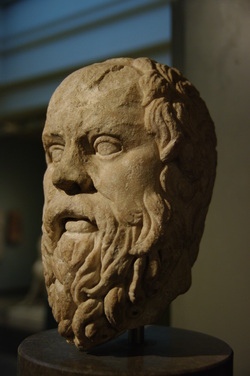 Socrates: I know that I know nothing
Socrates: I know that I know nothing Morally speaking, you are humble or you are not. Normal people are not humble. We are infected with vanity, small or big. Call it dignity, ambition, honour, self-worth or other names much less honourable, the flaw of pride is a prime mover for us.
Genuine modesty is a rare virtue that cannot be suddenly willed. It grows in time, if ever, when we have to face our limits, by means of intelligence and understanding, through suffering and loss.
But you can practice honest humility right now, and it gives amazing power. In time it may become a habit or even the real thing.
Imagine your courtship of humility as the daily hunting of your pride. An easy exercise we can all practice. Soon, it will become a reflex.
If you learn thus to catch yourself, quietly, when you are about to be driven by pride, you will, by the simplest of means, harness frustration, stupid expense, imprudent risk-taking, unintentional offending of people, rousing envy, bragging ridiculously, making hollow promises,... a long list of foolish loss that diminishes our choices and so, our freedom.
All you have to do, instead of falling into the vanity game, is to observe that your pride is at work; once observed, you can decide whether you stop being plaid, or, why not, that you allow your pride to be tickled in this harmless occasion – for sheer cheap pleasure, as a treat of indulgence. However, be careful not to fool yourself into addiction.
Detect the many who exploit your pride and flatterers will lick you with no profit. Blackmailers of the loss of face, racketeers of self-admiration will lose a fat client.
Imagine humility as seeing yourself and everybody else as the tiny, fleeting, vulnerable, forever ignorant beings which we are in this infinite universe. Mere intelligence proves the truth of this. You will suddenly be wiser than most around you, a Socrates qualified to understand people because you use the same solid measure to judge yourself.
Humility in attitude is to declare yourself agnostic of absolute truth and religion, because if God exists, we are nothing and nobody indeed to pretend that we understand Divinity and fools indeed to pretend that we are entitled to represent Divinity on earth or speak on its behalf. By this awareness you will be entitled to judge how grotesque are the morons and fanatics who pretend to revenge their God or impose to other people their own faith. Humility in science is to draw modesty from the knowledge that science evolves forever and keeps falsifying the methods and the certainties.
Learn to say: “I do not know”, “It is the first time I hear about this.”, “No, I never read that book.”, "At this point I am convinced that...", "I did not understand" [1] ,“Sorry, I was wrong.”, “Please help me”, “Yes, you were right.” and “I will do my best.” People will respect you if you look them in the eyes while you say these things.
Though, to practice humility you need a certain well being. You behave humble because you chose so, not because you were thrown down on your knees and humiliated. To act humble you must have a choice. There must be someone inside you. You need reserves of self-esteem and dignity and courage built up inside you, some experience with pride satisfied. Insecure nobodies anxious to pretend that they know when they don’t or than they can when they are useless, cannot even conceive humility; it is for them like losing their trousers in public.
*
The supple can overcome the stiff.
Under heaven everyone knows this,
Yet no one puts it into practice.
Therefore the sage says:
He who takes upon himself the
humiliation of the people is fit to rule
them. [2]
True words seem paradoxical
[1] Read Montaigne: "There is a certain sort of crafty humility that springs from presumption, as this, for example, that we confess our ignorance in many things, and are so courteous as to acknowledge that there are in the works of nature some qualities and conditions that are imperceptible to us, and of which our understanding cannot discover the means and causes; by this so honest and conscientious declaration we hope to obtain that people shall also believe us as to those that we say we do understand."
Michel de Montaigne, Essays, Book II, “Of the most excellent men” (tr. Cotton)
[2] The Tao Te Ching, #78, Translation by Gia Fu Feng & Jane English Vintage Books, 1989
 RSS Feed
RSS Feed